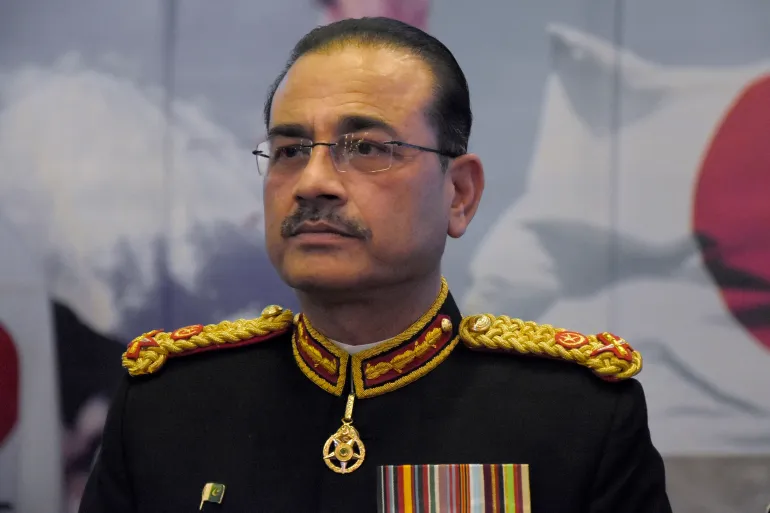A dramatic turnaround in public opinion
Asim Munir’s Popularity Soars After India Row
This “rally‑round‑the‑flag” effect swiftly transformed Asim Munir from a divisive figure into a symbol of national solidarity and resilience. Following the worst escalation with India in decades—centered around the April 22 terrorist attack in Indian Kashmir and the ensuing cross‑border strikes—Pakistan saw a dramatic shift in public sentiment toward its military leadership. A Gallup Pakistan survey released on May 21 revealed that 93 percent of respondents reported an improved opinion of the military, while 97 percent rated its performance as “good” or “very good” during the conflict.
This “rally‑round‑the‑flag” effect swiftly transformed Asim Munir from a divisive figure into a symbol of national solidarity and resilience.
From controversial figure to national hero
Before the conflict, Munir faced intense criticism domestically for his crackdown on Imran Khan’s supporters, alleged political interference during the 2024 elections, and the use of military courts to try civilians
However, when the India‑Pakistan crisis erupted, Munir’s assertive and ideologically framed leadership—including naming Pakistan’s counter‑strike “Bunyan Marsoos”, invoking Koranic symbolism—resonated with many, reframing him as a defender of national honor
Public demonstrations and political reconciliation
Across Pakistani cities—Punjab, Khyber Pakhtunkhwa, Sindh—people carried banners saying things like “Long live General Asim Munir!” and “You are our saviour!” Even staunch opponents began to soften rhetoric: Imran Khan posted on X, “It’s my country, it’s my army… I pay tribute to the Pakistan Air Force and all our military personnel for their professionalism and outstanding performance”
Institutional rewards and consolidation of status
Within two weeks of the ceasefire, Munir was promoted to the ceremonial rank of Field Marshal, becoming only the second Pakistani to earn that five-star title since Ayub Khan in 1959 The cabinet unanimously approved the elevation on May 20, framing it as recognition of his strategic leadership in repelling Indian aggression and safeguarding Pakistan’s sovereignty
Observers suggest this promotion not only cements his prestige but also increases his political leverage—reinforcing the military’s dominance over civilian institutions under a ruling coalition aligned with Munir
Economic and geopolitical context
Pakistan’s economy had begun to recover—from inflation falling from over 38 percent in mid‑2023 to nearly 0.3 percent in April 2025, and foreign reserves stabilizing at over $10 billion—amid improved investor confidence and military-backed economic initiatives like SIFC, which Munir co-chairs
In the international arena, NATO‑style narrative amplification framed the military’s actions in a favorable light, with foreign commentators talking about Munir as Pakistan’s “strongman” and a now‑heroic figure
Dissent, satire, and criticism remain loud
But not everyone is convinced. Critics within Pakistan and abroad have mocked the Field Marshal elevation, especially given reported losses: memes and satirical commentary questioned rewarding Munir “after bombed airbases” and strategic failures during Operation Sindoor. A billboard in New York’s Times Square—assembled by sections of the Pakistani diaspora—depicted Munir alongside political leaders with labels like “Loser” and “Deceiver”
Analysts argue the elevation could reinforce military dominance in governance while further marginalizing Pakistan’s opposition—raising concerns about democratic backsliding and civil rights erosion, particularly amid expanding use of tribunals to prosecute dissenters
Strategic implications for Pakistan’s future
With public sentiment overwhelmingly positive and political elites—including Nawaz Sharif and Asif Ali Zardari—backing him, Munir now enjoys a position of immense authority, potentially extending beyond his current term ending in November 2027 READ NEXT https://elevenpakistan.com/michael-jacksons-iconic-glitter-socks-auctioned/
Experts foresee two possible trajectories: Munir may seek rapprochement with Pakistan’s fragmented political landscape, or he might double down on authoritarian policies, particularly in restive provinces like Balochistan and KP, where support for the military remains weaker
In summary
- Survey data shows overwhelming public approval of the military after the conflict (93 percent improved view, 97 percent rating performance positively).
- Munir’s image transformed from controversial figure to hero through assertive leadership and religious-nationalist rhetoric. x
- Mass public displays and reconciliatory statements—even from political rivals—signaled shifting sentiment.
- Ceremonial Field Marshal promotion consolidated Munir’s authority and reinforced military–political control.
- Economic stabilization and international narrative support undercut previous criticism.
- Domestic satire and dissent remained, highlighting skepticism about the legitimacy of his elevation.
- Strategic control of Pakistan’s institutions is now firmly in his hands, but future direction—authoritarian or inclusive—remains uncertain.
Overall, recent public opinion surveys offer a clear picture: amidst the India‑Pakistan crisis, General Asim Munir’s popularity has skyrocketed, his public standing normalized, and his institutional power expanded—raising profound questions about Pakistan’s democratic trajectory and civil-military balance.
READ NEXT



